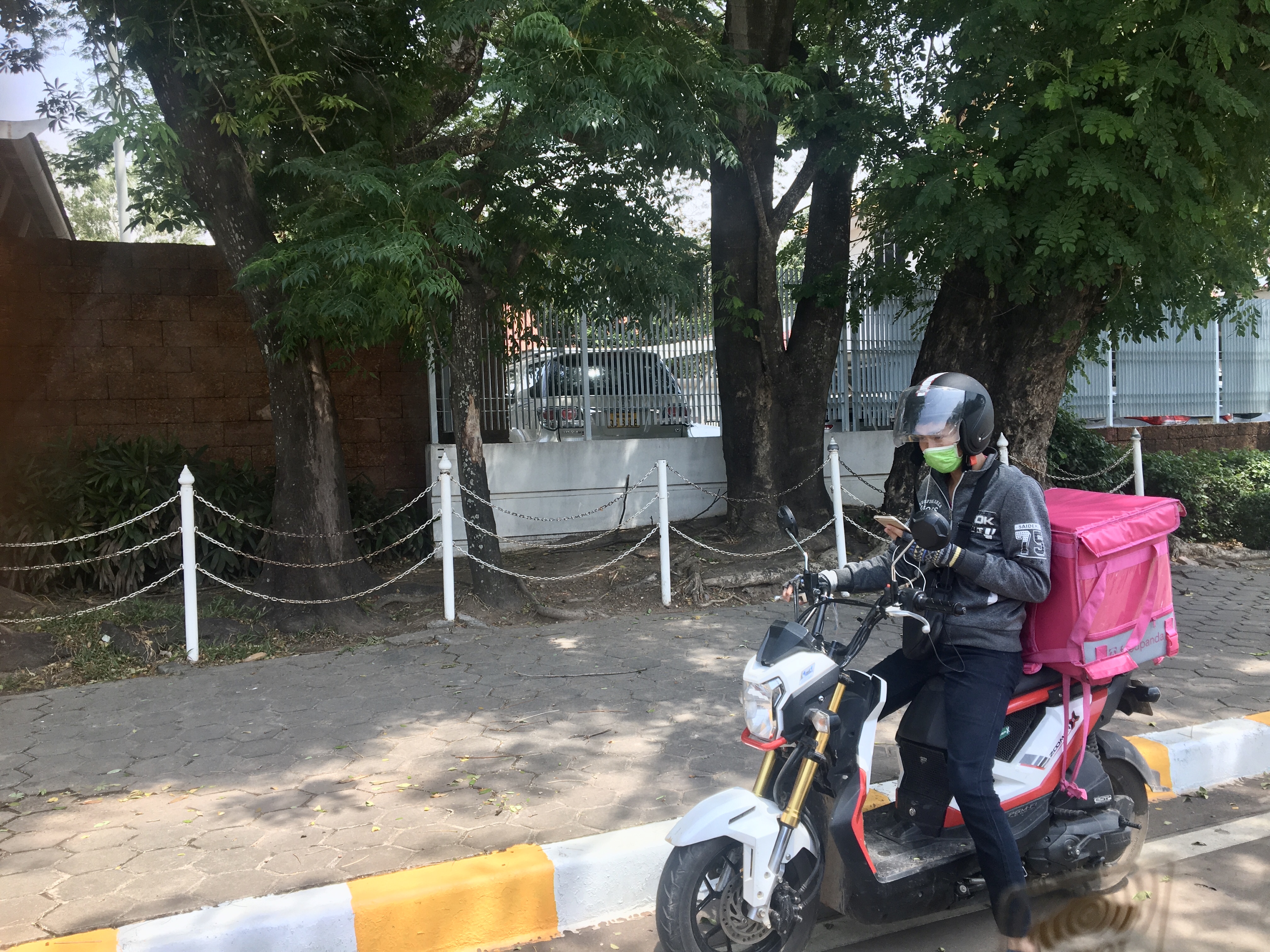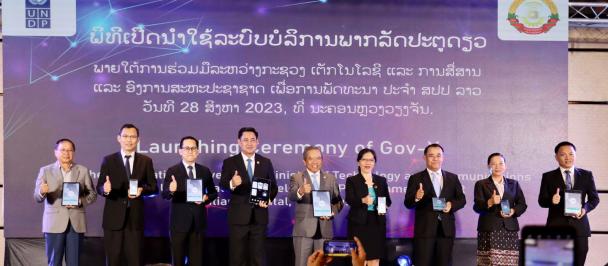A delivery man using his phone to navigate his way to his customer's destination. Photo: UNDP Lao PDR
As I was lining up to get my takeaway noodle soup at my neighborhood restaurant, with the requisite two-meter distance etiquette , my attention was drawn toward the owner, who appeared to be very tech savvy. The way she effortlessly managed online orders, while handling QR code transactions with other customers, was nothing less than surprising.
It is unlikely that one would have witnessed this scene prior to the COVID-19 pandemic. It has changed the way people view and use technology in Laos, even those who haven't been exposed to it.
On March 30, 2020 the Lao government declared a state of lockdown, which meant that nearly all business was being put on hold, or severely curtailed. For most restaurants, only takeaways were allowed, causing most staff to be put on leave.
In such circumstances, a lot of people, particularly entrepreneurs and employees, needed to pivot and find ways to economically survive. Especially in Vientiane, the country’s quiet capital, digital transformation has been accelerated by the pandemic and could lead to wider use of digital technology and innovation for development, in Laos.
Industry 4.0 has been applied faster than we thought
A few years ago, most massage parlors and local cafés couldn’t manage a digital transaction. The idea of paying through mobile applications seemed like wishful thinking. Fast forward to 2020, and due to a stronger internet penetration, most restaurants, even street vendors and small businesses, are handling financial transactions with ease, through smartphones.
New businesses have helped bring this digital transformation into society. The capital Vientiane is experiencing rapid technological innovation, mostly among startup communities.
When Loca, a local mobile ride share service, was introduced to the market in early 2018, there was only one driver, in the first month. However, by February this year, Loca hired more than 300 drivers. Though reluctant at first, many people also resorted to food delivery services, to help them practice social distancing and stay safe.
During that same month, Go Teddy and Food Panda estimated the amount of online orders had grown from roughly between 100-200 to around 1200-2000 orders per day. Moreover, the number of local restaurants and small shops registered on both platforms have also multiplied three folds from 50 in January, to 150 in May. The streets are colored with delivery bikes zooming across roads, during this lockdown.
For many people, Go Teddy and Food Panda have also offered an economic lifeline. More than 300,000 hotel rooms and several customized tours were canceled, since January. Numerous people have lost income or even their jobs, but many have also found alternative employment and income, through technology enabled services.
In March, groups of individuals signed up for delivery jobs with these two major platforms, whose employment numbers have swelled from less than 100 in the beginning of the year, to more than 2000 in mid-April.
COVID-19 has also had an impact on how people learn and work. Working from home has allowed staff to practice and hone their online skills, and this has been especially useful for individuals who weren’t used to technology.
For students, virtual classes via online platforms were a novel, but easy way to share lessons and practice, as free online courses were made available worldwide. Information and knowledge could be accessed at the tip of fingers anytime and anywhere.
For Pasert Xiong, 20, a freshman at the Lao American college, from Phongsaly province, said that online learning has improved his academic performance. He believes that social media platforms, were useful, to connect with his teachers and classmates, facilitating discussions of assignments and presentations. As a shy individual, Pasert also mentioned that, compared with face to face conversation, studying online boosted his self-confidence substantially, when it came to exchanging opinions.
How could Laos make a move with this new normal?
On a global scale, several entities are now working on mitigating this economic shock for those most affected. In Argentina, for instance, the UNDP Accelerator Lab team along with local governments, came up with the Pay in Advance campaign, aiming to support those economically affected by the lockdown, especially, vulnerable groups of people and women entrepreneurs. Meanwhile, the Uzbekistan team has organized a COVID-19 IT Challenge crowdsourcing session with more than 600 ideas to tackle this issue over just one weekend. On the other side of the Atlantic, the Caribbean team is running #IslandHackaton with local sectors to seek solutions, in order to restart the economy.
Still on the road to graduating from Least Developed Country, Laos needs to leverage the best from this global health crisis and its own local context, to see what the “best fit” would be. This situation has connected people with technology and information, like never before. Businesses are transforming the way they operate, and social startups are sprouting despite the tough times.
COVID-19 could help innovation leapfrog, to the center of policy and programming, in Laos. Although the pandemic has thrown up many obstacles, it also provides an opportunity to introduce digital advancements that can help the country tackle the pandemic itself and other complex development challenges.
Written by:
Khavi Homsombath, Head of Experimentation, Accelerator Lab, UNDP Lao PDR
The views expressed in this article are those of the author alone and not the United Nations Development Programme.

 Locations
Locations




